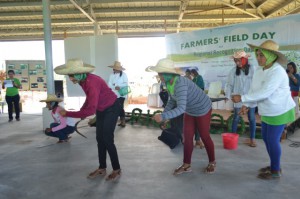LIGAO CITY, ALBAY ― Around 400 upland farmers from the Bicol region completed a training program in upland rice production during PhilRice Bicol’s Field Day and Regional Recognition Day, 19 November. 
The farmers participated in the Upland Palayamanan Farmers Field School where they established a diversified farming system integrating upland rice, vegetables, and other crops.
Graduates came from the provinces of Albay, 70; Camarines Norte, 40; Camarines Sur, 198; Masbate, 30; and Sorsogon, 72.
The said training program aimed to strengthen cultivation of upland rice in the region. It adheres to the Upland Rice Development Program (URDP) in promoting sustainable farming systems and practices in upland communities.
Ruben B. Miranda, URDP program leader, encouraged the graduates to establish and strengthen cooperatives for upland farmers. This willl allow them to avail government projects such as the farm mechanization program.
Miranda also challenged the farmers to produce quality organic upland rice that could cater to local or even international market.
Meanwhile, a review and planning workshop was conducted on 20 November to assess impacts and map out sustainability plans of URDP in the Bicol region.
Coping with climate change
The El Niño phenomenon persists in many parts of the country including the provinces of Bicol. But many farmers remain resilient.
When typhoon Glenda hit in 2013, Bula river overflew and affected many rice fields.
“When we were losing our livelihood in lowland, we intensified upland farming for food self-sufficiency,” said Reynato A. Esteve, agricultural technician of Bula, Camarines Sur.
While waiting for major crops to prosper, farmers of Brgy. Lubgan in Bula cultivate root crops. Camote or sweet potato yielded the highest at 3 t/ha, enough to supply the local market.
Leonora N. Dotillos, one of the URDP graduates and also from Bula, practices diversified farming in her 2-ha farm. Succesive heavy rains and dry condition in the last few months affected her upland rice field.
Yet, the livelihood of the 67-year-old farmer easily recovered with vegetables and legumes that withstood adverse weather conditions. Along with rice, she also planted eggplant, moringa, cabbage, tomato, and monggo.




